Politics
After the fall, UML hatches comeback plan around Oli cult
In a show of strength, the party is holding its first statute congress, setting the stage for Oli to become the uncontested leader and shunning collective leadership and organisational system.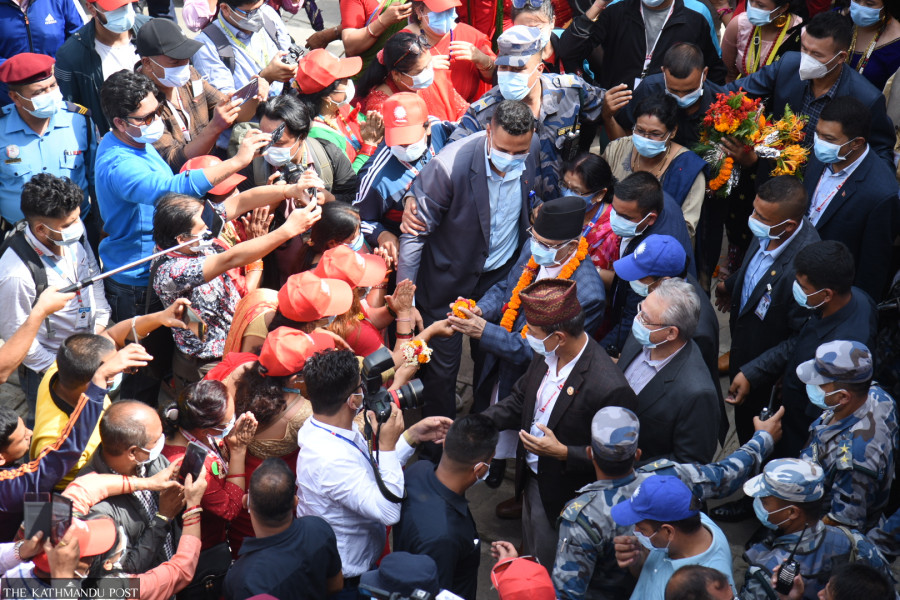
Anil Giri
All red. At first glance, one could easily mistake it for a communist jamboree in China, or any other communist country for that matter.
The Communist Party of Nepal-Unified Marxist Lenininist, or the CPN-UML as it is known, began its first ever statute congress on Friday with pomp and show. At the heart was KP Sharma Oli, the party chair.
There was no mistaking the event aimed to set the stage for Oli to lead the party for yet another term, uncontested.
The statute congress of Nepal’s largest party in Godavari, on the southeastern rim of the Valley, was kicked off by Oli, whose political document was presented before around 6,000 representatives who have descended on the Capital from across the country. Oli’s political document has already been endorsed by the party’s Standing Committee and Central Committee.
The pomp and pageantry for Oli was evident—his cardboard cutouts were installed all around the newly constructed conference hall in Godavari and the representatives scrambled to click pictures and take selfies with their larger-than-life leader. Even water bottles had labels of Oli, whom party members have of late started calling “baa”, meaning father.
The statute congress, from October 1-3, is being organised in the lead up to the party’s general convention scheduled for November 18-22.
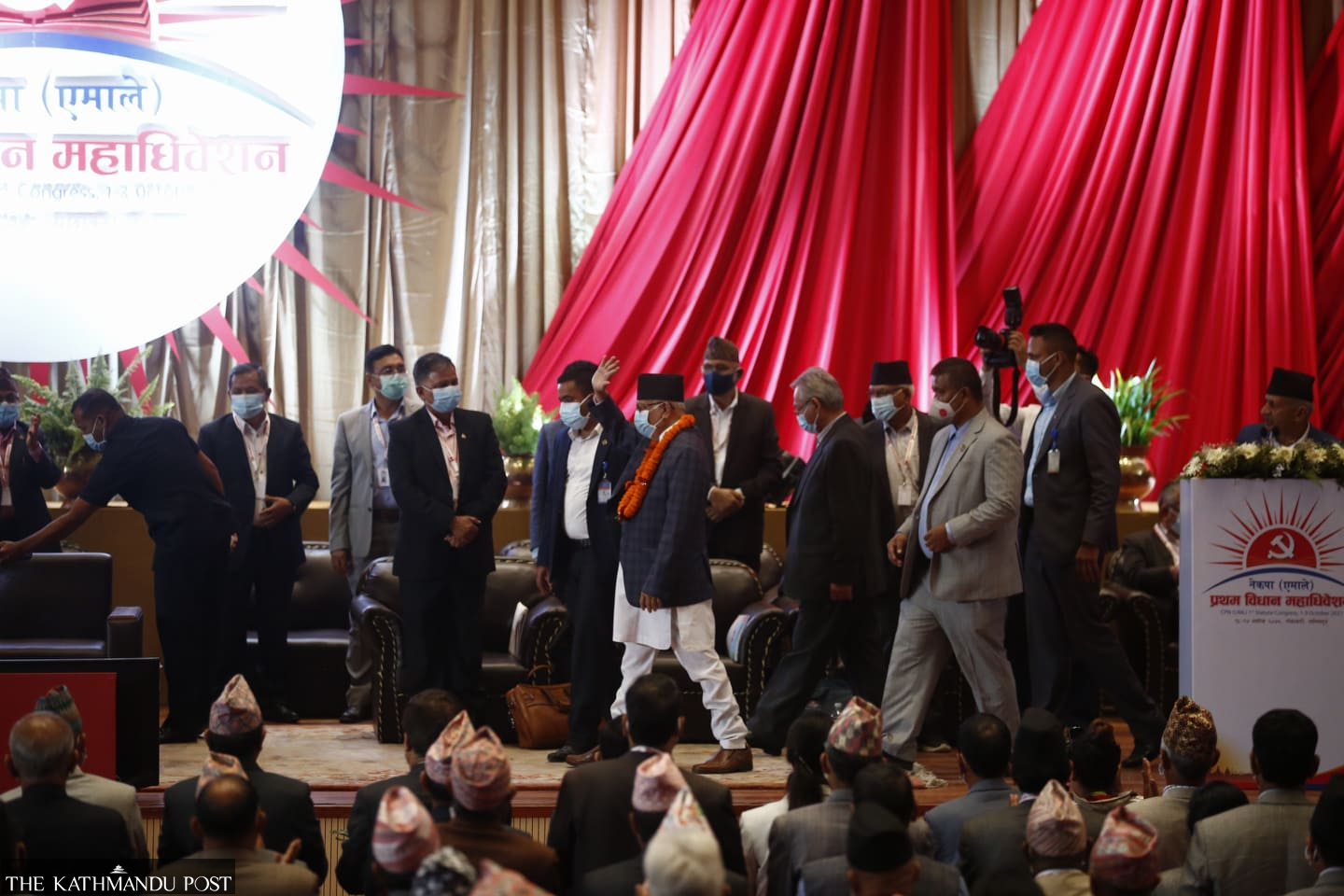
Observers say some key messages the UML is trying to send out are clear—there’s no alternative to Oli to lead the party, the UML is the only “true” democratic communist party and it is going to make a grand return in the upcoming general elections.
It was Oli who led the party to victory in the last elections held in 2017. Despite having a comfortable majority, after the UML and the Communist Party of Nepal (Maoist Centre) merged in May 2018, Oli could not govern for a full term.
He was ousted by the Supreme Court on July 12 following his May 21 decision to dissolve the House of Representatives, for a second time in six months. Neither Oli nor his party members are ready to accept that the move was unconstitutional, even though the Supreme Court has interpreted so.
A divorce between the UML and the Maoist Centre was also affected by the Supreme Court in March this year. The statute congress of the UML is being held hot on the heels of a split it faced, as Madhav Kumar Nepal, who had led the communist party for 15 years, decided to break off and form a new party, the CPN (Unified Socialist).
The Maoist Centre and the CPN (Unified Socialist) are currently backing the government led by Sher Bahadur Deuba, the Nepali Congress president.
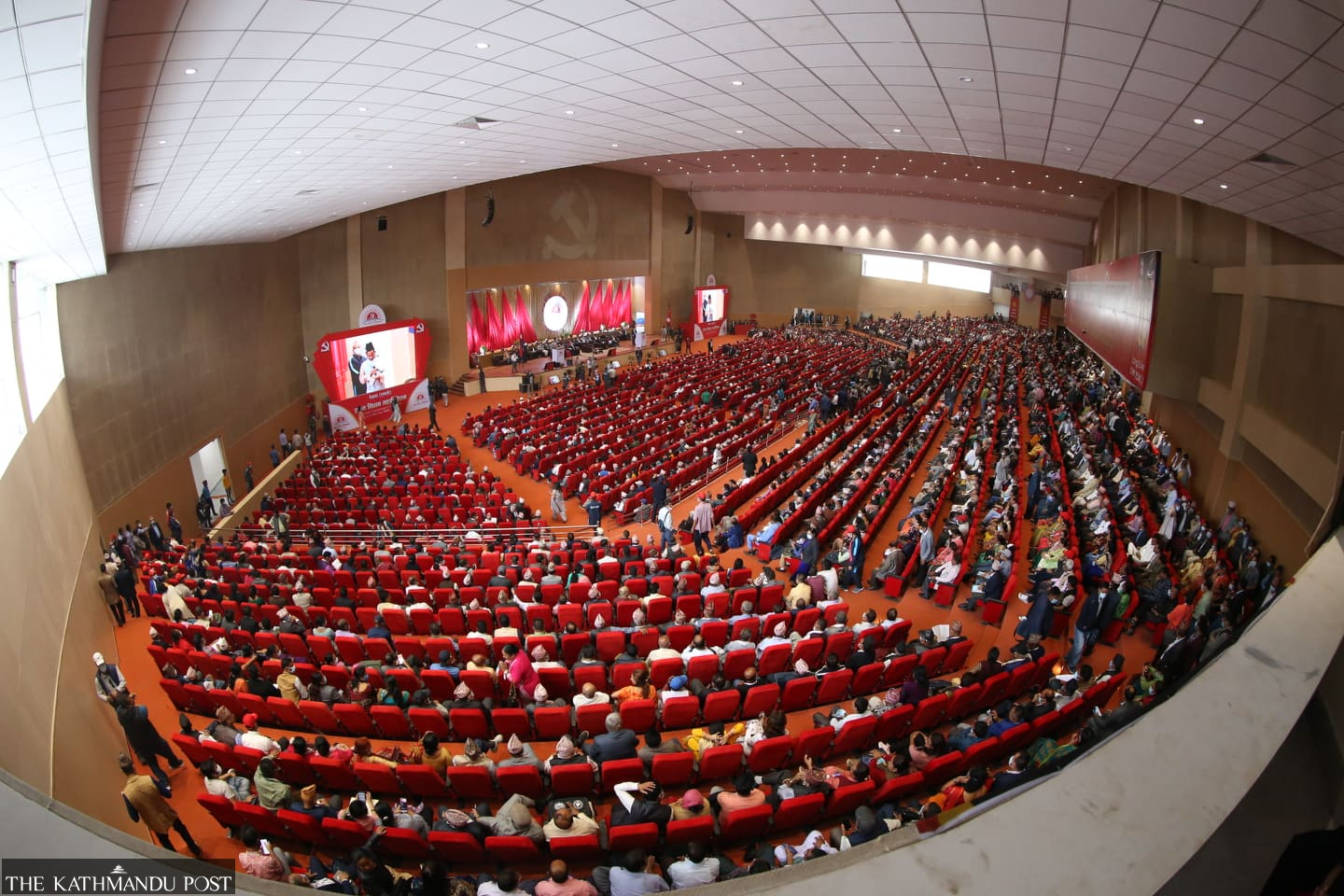
The UML has branded the current government an outcome of an unholy alliance installed by the Supreme Court. And the party through the statute congress aims to consolidate its fight against the ruling alliance, by presenting itself as a strong opposition, with its sights set on elections.
“The UML is now turning into a mass-based party from a cadre-based party, and this statute congress sets the stage for the same,” said Hari Roka, a political analyst. “What it also demonstrates is that it is departing from Leninism, which calls for a collective leadership. Now Oli is the ‘leadership’, Oli is the ultimate leader.”
Three separate documents were presented on Friday, including one by Oli. Party General Secretary Ishwar Pokhrel presented a document on the party's organisational structure and Deputy General Secretary Bishnu Poudel presented a statute amendment proposal. Both the documents presented by Pokhrel and Poudel too have been already endorsed by the party’s Standing Committee and Central Committee.
“What has become clear is Oli’s party has not bid adieu to Leninsim, a core ideology it has followed since its adoption,” said Roka. “The UML through this congress appears to be aiming to create a huge organisational set-up. Collective leadership will be missing, as UML is surely going to be a party led by an individual.”
The party has vowed to double its membership, make People’s Multiparty Democracy propounded by the late Madan Bhandari as the party’s guiding principle.
Friday’s statute congress greeted all the participants with the slogan “People’s Multiparty Democracy”, in what is viewed as an assertion that the party is going to follow the ideology even as there are some voices, feeble they may be, that the party needs to move forward.
The UML is making a strong pitch for People’s Multiparty Democracy also because it aims to throw the splinter party, CPN (Unified Socialist) into a tizzy, as it too has been harping on the same political ideology.
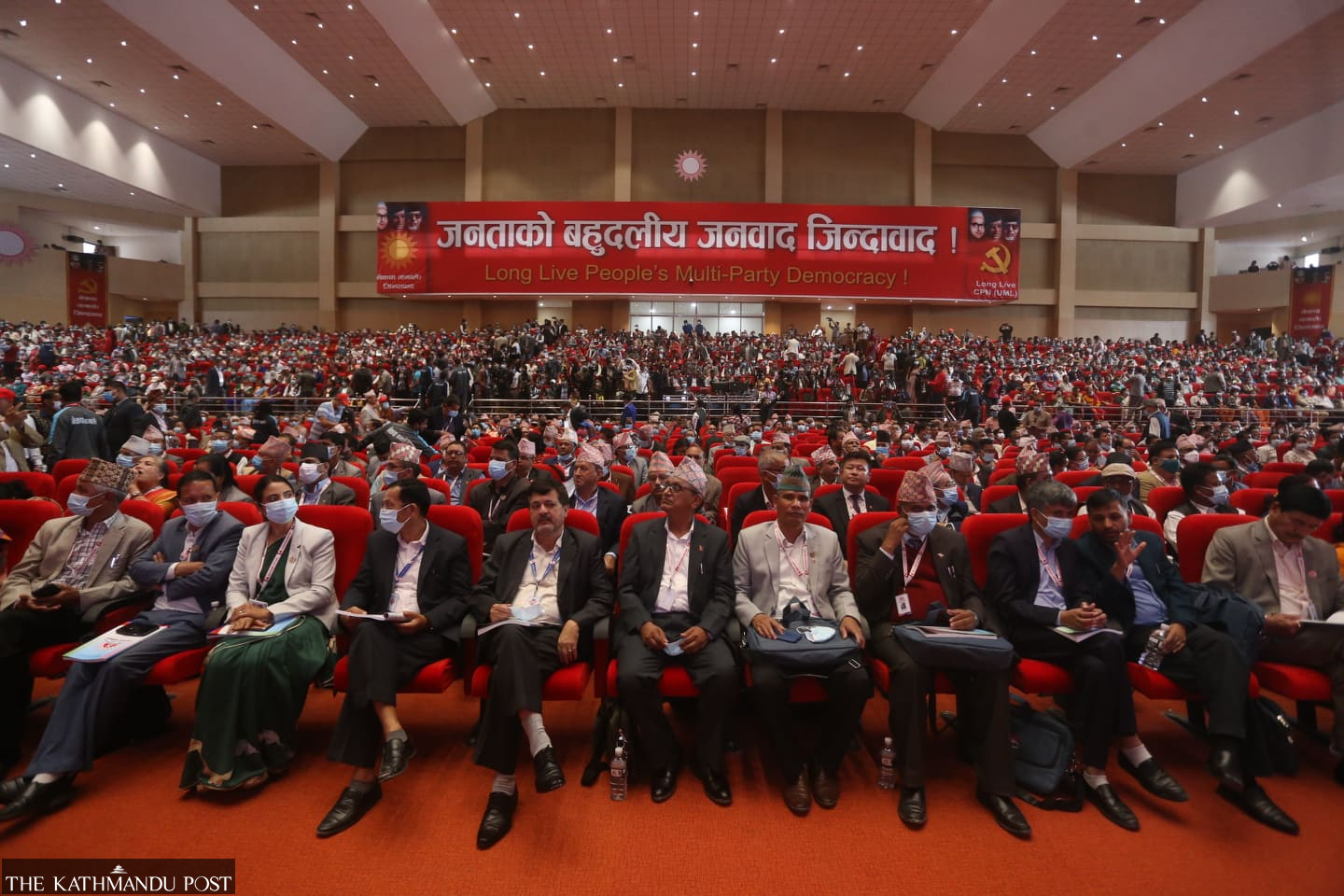
Observers say since Oli faced a lot of criticism for his misadventures when he was in power, the UML is trying to present itself as the only democratic communist party.
UML leaders say the essence of People’s Multiparty Democracy is democratisation of communist movement, politics and society. And they see Oli as the “only right candidate” who can steer the party by adhering to this core ideology.
Critics, however, wonder if the UML is creating a contradiction, as it is elevating Oli as the uncontested leader while harping on democratisation. Observers say what is also intriguing is that the UML seems to be building the Oli cult.
Oli, 69, was elected party chair in July 2014 from the ninth general convention. For Oli, a long-time communist leader, it has been a humble rise to the top.
He started his political career in 1966 against the then Panchayat regime and joined the Communist Party of Nepal in 1970. He is one of those communist leaders who beheaded people who they termed “class enemy”, something the Maoists did when they launched their “people’s war” in 1996. He was put in jail for 14 years from 1973 to 1987 for protesting against the Panchayat regime.
After the restoration of democracy in 1990, he was elected to the House of Representatives from Jhapa. He then went on to serve as home minister and foreign affairs minister. He faced a setback when he lost the first Constituent Assembly elections in 2008. But he made a comeback when he won the elections in 2013. A year later, he managed to win the party election to become party chair. In the lead up to the promulgation of the constitution, he had become a central figure in Nepali politics. He became prime minister for the first time in October 2015 after Nepal adopted its new constitution. A border blockade imposed by India prompted Oli to turn to China. During his visits to Beijing, he signed a slew of agreements that he called a bid to rid Nepal of India’s grip.
Oli won the 2017 elections riding on the ultranationalistic plank.
It was then he started to project himself as the numero uno among Nepali political leaders. The personality cult around Oli had been a work in progress ever since he returned to power as the strongest prime minister in February 2018.
Those who know Oli closely say the communist leader has an uncanny tendency to hold the court, turning any conversation towards him, and putting himself at the centre.
From the statute congress of the UML, the Oli cult appears set to move one notch up, as party members are bent on putting their “dear leader” above the institution. The pageantry and veneration bestowed upon the leader in recent months and the reverential documentary on the leader on Friday at the statute convention provide a peek into how the Oli cult is taking a stronger shape in the party.
In his political document, Oli has come down heavily on communist leaders like Madhav Kumar Nepal and Pushpa Kamal Dahal, chair of the Communist Party of Nepal (Maoist Centre).
Even though both of his decisions to dissolve the House were overturned by the Supreme Court calling them “unconstitutional”, Oli in his document has attempted to justify his moves.
Oli has also made several proposals on how to “purify the party”.
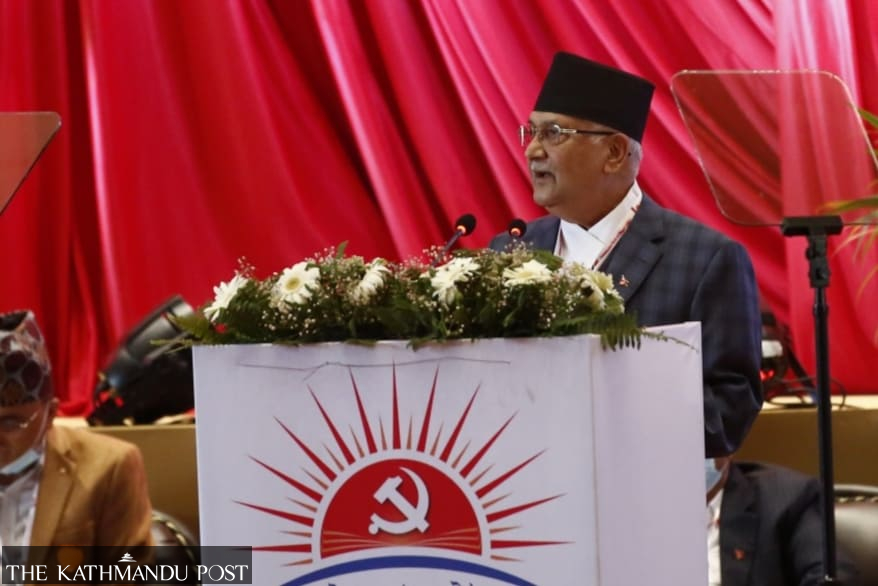
Political observers say though the UML is organising what it calls the statute congress, it is devoid of political debates, which is considered speciality of communist parties.
“But the UML has utterly failed in defending its three years in government. It has failed to create a narrative around its three years in power,” said Dambar Khatiwada, a political analyst. “Oli has rather defended his decisions that are against democracy, constitutionalism, separation of powers and rule of law as well as other fundamentals of democracy.”
According to Khatiwada, UML’s democratic credentials could come into question when it moves towards becoming a party led by one man.
“The UML, however, appears to be bent on establishing Oli’s narrative, with no one there to question him,” he said.
When Nepal’s first communist party was formed around seven decades ago, the basic idea was to launch a struggle against feudalism, autocracy, comprador capitalism and imperialism. But in the early 1990s, the late Bhandari worked on developing an extension to Marxism-Leninism and proposed an ideological line, which he dubbed People’s Multiparty Democracy. The thought abandoned the traditional revolutionary idea in support of a democratic multiparty system. This line was adopted in 1993.
On Friday, Pokharel, the general secretary, asserted that People’s Multiparty Democracy is “the most revolutionary thought” at this time and hour.
“The UML that claims to believe in the parliamentary system and multiparty democracy has shunned the principle of collective leadership, and it is a total failure,” said Roka. “It has now decided to opt for one-man leadership, which means the party will become more rigid, regressing to a more rudimentary stage. In a communist party, organisations and committees and collective leadership should prevail.”
On Friday night, Ghanashyam Bhusal, one of the dissident leaders who have launched a struggle against Oli in the UML, made a telling statement on social media.
“Collective leadership and organisational system have been the lifeblood of the UML,” Bhusal wrote on Twitter. “If we cannot save those, nothing can save us. If we can comprehend this fact, no one can defeat us.”




 22.12°C Kathmandu
22.12°C Kathmandu















